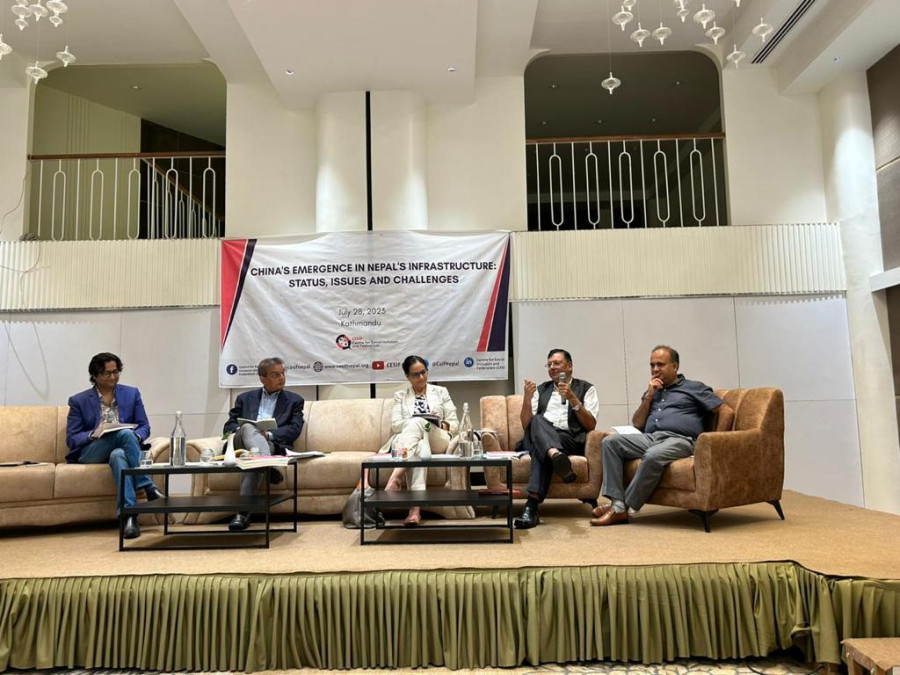National
‘China’s Emergence in Nepal’s Infrastructure: Status, Issues and Challenges’ launched
Panellists shed light on nexus of corruption that Chinese infrastructural projects had built, their inclination towards party-to-party relations and need for Nepal’s political and bureaucratic front to work together on its negotiation techniques.
Post Report
Participants at a seminar in Kathmandu on Friday discussed China’s involvement in infrastructure projects in Nepal, its issues and challenges.
The discussion brought into account the nexus of corruption that Chinese infrastructural projects had built, their inclination towards party-to-party relations, especially the left political forces, and the need for Nepal’s political and bureaucratic front to work together upon its negotiation techniques, the organiser the Centre for Social Inclusion and Federalism said in a statement.
The interaction was held following the launch of the book ‘China’s Emergence in Nepal’s Infrastructure: Status, Issues and Challenges’ authored by noted writer Amish Raj Mulmi, senior journalist Anil Giri, Co-founder of The Araniko Project Raunab Singh Khatri, CESIF’s Research and Program Coordinator Arpan Gelal and CESIF’s Researcher Milan Acharya.
Presenting the key findings and analysis of the book, author Mulmi discussed the mechanisms of the Chinese infrastructure engagement in Nepal and provided a succinct comparison of the infrastructural investment by China, India and Japan in Nepal, in which he commended Japan’s debt relief practices.
Also speaking, former secretary Lal Shanker Ghimire said the infrastructural funding is no different and must be viewed from that same lens.
He further said that a lack of proper negotiation has led to some of the unfair deals, adding that this lack of negotiation stems from the inferiority complex and lower bargaining capacity of Nepali bureaucrats.
Also speaking, Sucheta Pyakuryal, director of the Center for Governance and Academic Affairs at IIDS, said Nepal is not in a scary position given the status of economic indicators.
‘Nepal, as a country is weak, and thus, commercial projects tend to make a weak state weaker. Therefore, we need to look upon the knot and bolts of our government while dealing with the funded infrastructure projects,’ said Pyakuryal.
Likewise, Rajib Upadyay, former senior external affairs officer at the World Bank, shared his opinion on how resources are finite now.
‘The era of cheap money is now over. In particular because of three reasons: firstly, the West is heading towards recession. Secondly, rising global tensions have brought geopolitics into the economic discourse. Thirdly, the defence budget is increasing amongst NATO countries,” he said.
Similarly, Deependra Nath Sharma, former urban secretary, reflected upon the lack of definite institutions to oversee infrastructural governance, adding that the National Planning Commission needs to involve itself more.
“Especially, when projects do not complete in the intended period, there is a blame game, and cost overrun, among others. There is also a public procurement monitoring office but it barely monitors anything. It provides suggestions on disputes but doesn’t monitor, per se. Thus, there is clearly an institutional gap,” he said.
Vijay Kant Karna, executive chair at CESIF, said the book is expected to provide insights into the patterns of Chinese engagement in Nepal’s infrastructure.
“The report is expected to provide insights into the patterns of Chinese engagement in Nepal's infrastructure. The report also discusses the nexus between the local agents of Chinese contractors and Nepali decision-makers,” said Karna.
Moderator Ajaya Bhadra Khanal summarised the discussion by reflecting that there exists a plethora of aspects of infrastructural development and that Nepal needs to prioritize its national interest while negotiating for infrastructural development deals, the organiser said.




 9.83°C Kathmandu
9.83°C Kathmandu













